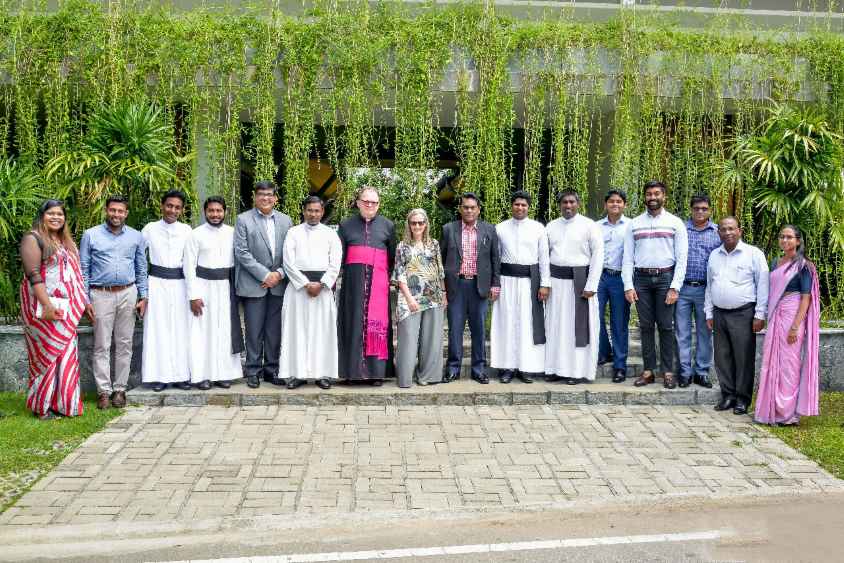
María Fernanda Garza, Chair of the International Chamber of Commerce (ICC), visited the Benedict XVI Catholic International Institute of Higher Education (BCI) in Sri Lanka during her inaugural visit to the country recently.
The purpose of her visit was to engage in a meaningful dialogue on possible collaborative initiatives between BCI and the ICC, with a shared vision of enhancing educational and training opportunities for the youth of the nation
Present at the meeting with Ms. Fernanda were Anthony M. Shanil Fernando (Chairman, ICC Sri Lanka), Jonny Fernando (Vice-Chairman, ICC Sri Lanka), Very Rev. Fr. Quintus Fernando (Rector/Vice Chancellor, BCI), Jamie Warnakulasuriya (Career Guidance Coordinator, BCI) and Sasini Fernando (Programme Lead cum Lecturer – School of Business, BCI).
Both parties expressed interest in collaborating on impactful education and vocational training programmes to empower Sri Lankan youth, especially those unable to access higher education. Discussions centered on creating tailored courses based on economic needs and emerging careers that can equip youth with much-needed skills to improve livelihoods. The potential partnership between ICC and BCI represents a constructive initiative to address Sri Lanka’s education challenges.
The presentation led by Rev. Fr. Quintus, Rector/Vice Chancellor of BCI, focused on the need for private institutions such as BCI to address demands in higher education, particularly in districts including Gampaha, Puttalam and Kurunegala. It highlighted BCI’s alignment with the Catholic education mission and holistic K-Sam model. Statistics on failure rates in O/L and A/L exams and insufficient university admissions underscored the need for tailored courses for unsuccessful students.
The discussion then turned to proposed collaboration between the ICC Academy and BCI’s Center for Professional Development, concentrating on women’s empowerment and entrepreneurship through an incubation center.
In response, ICC Sri Lanka Chairman Shanil Fernando discussed ICC opportunities for the grassroots, including its commitment to sustainability and the triple bottom line. He highlighted the ‘Multi-Modal Logistics and Transportation’ course enabling O/L unsuccessful youth to obtain shipping licenses and Free Trade Zone jobs. Mr. Fernando also noted the need to address supply chain job shortages through training. He proposed guiding A/L unsuccessful students towards arbitration and specialized fields such as cyber-crimes, agricultural education and financial literacy where ICC sees significant gaps.
ICC International Chair Ms. María Garza contributed views on women’s empowerment, discussing potential sectors aligned with Sri Lanka’s economy namely horticulture, agricultural trade and cosmetics. She recommended setting up a center for technology-based agriculture education, noting ICC’s new Agriculture Policy and Food Safety and Supply Chain Committee supporting food security. Emphasizing the triple bottom line, Ms. Garza reiterated the importance of environmental friendliness and employee welfare, stating an organization’s success is tied to employee well-being.
Overall, BCI’s association with a renowned global entity such as ICC creates new opportunities in terms of resources, expertise, visibility and networks, education programs and reach. The opportunity to collaborate with ICC’s global network and resources can expand BCI’s program offerings to develop new education and training. Additionally, access to ICC’s expertise and insights can create courses focused on high-demand careers.
Moreover, support from ICC in establishing an incubation center for entrepreneurship and empowering women could play a vital role in boosting innovation and enterprise at BCI.
Receiving visibility and endorsement from ICC can raise BCI’s profile and attract more students. In addition, potential future partnerships with ICC’s major corporate membership can benefit BCI students through collaborations, internships, etc.



